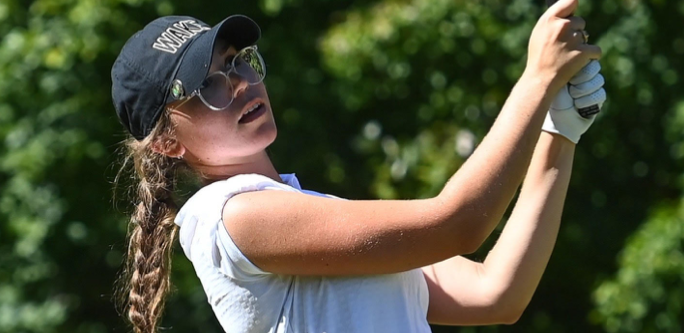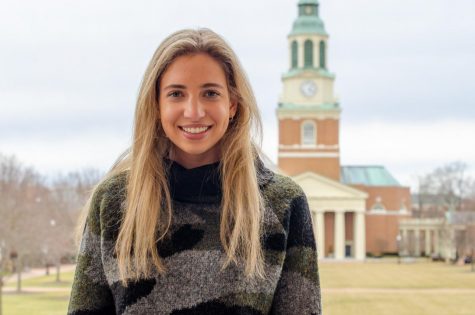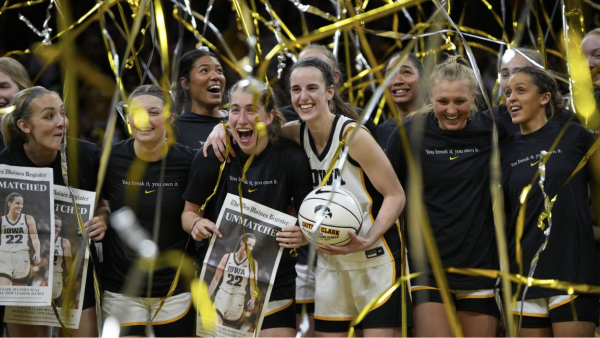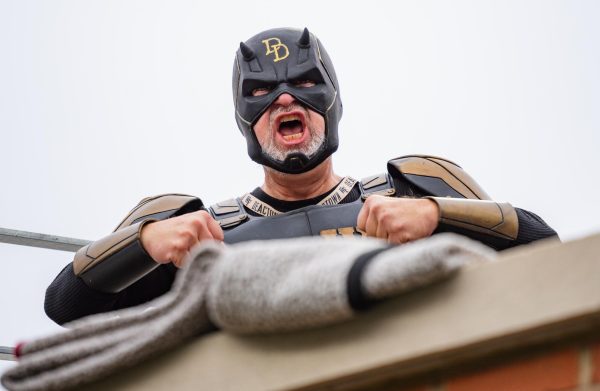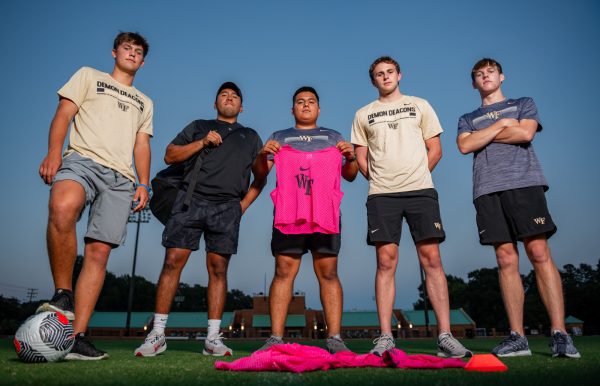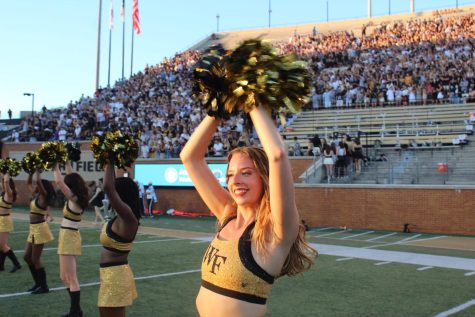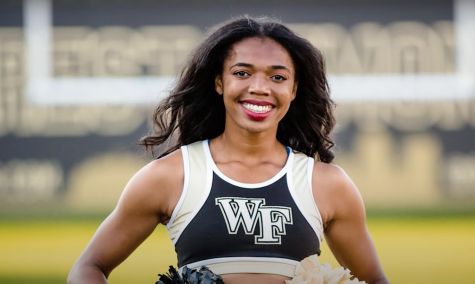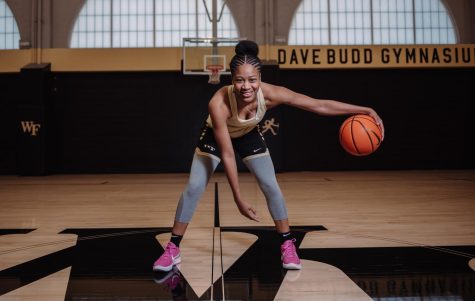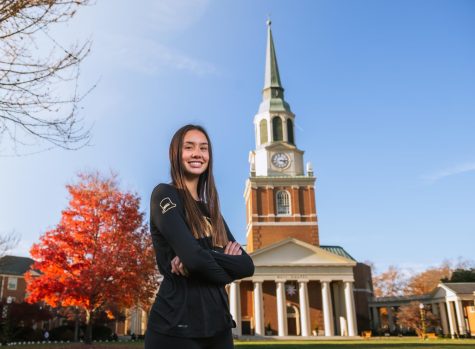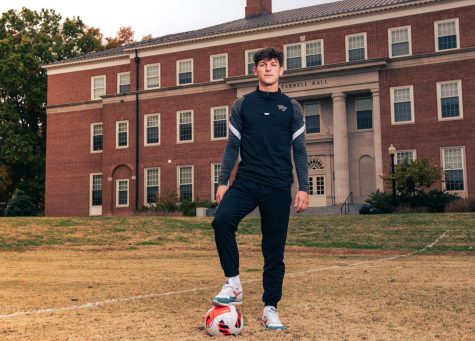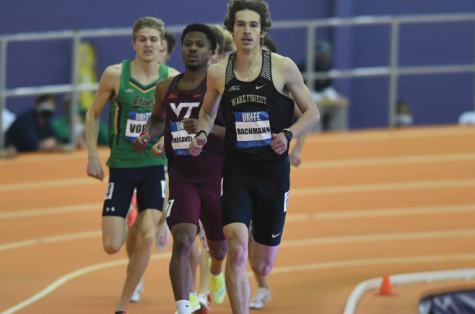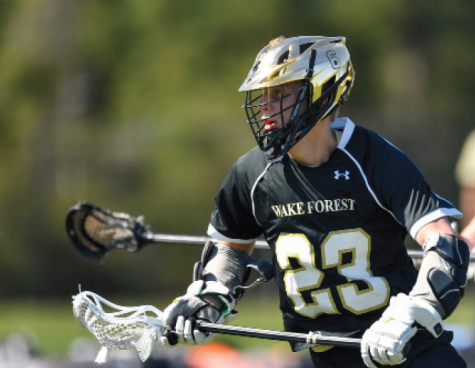Deacon “Sportlight”: Georgia Ruffalo
Ruffalo was a semi-finalist in the 2019 Florida Women’s Amateur Championships while she was in high school
Courtesy of Wake Forest Athletics
This past fall, Georgia Ruffolo competed in the Bryan National Collegiate and was the sec- ond-highest finisher on the B Team. She recorded an eight-over score of 224 to finish T26.
April 21, 2022
After a grueling four days, the women’s golf team has been crowned ACC Tournament champions. The team has a short time to celebrate, however, as the team approaches its next objective, the NCAA Tournament, which begins on May 9. I sat down to speak to redshirt freshman Georgia Ruffolo on Saturday, right in the middle of the ACC Tournament.
The Tampa, FL native is an asset to the already impressive golf team at Wake Forest. In high school, Ruffolo was a semi-finalist in the 2019 Florida Women’s Amateur Championship, tying for 7th of 132 in stroke play. She also won the 2019 IMG Season Kickoff and ranked in the top-25 in FSGA’s Women’s Player of the Year point list that same year. As the season’s intensity increases, Ruffolo is grateful for the support of her teammates, coaches and family members thus far in her collegiate golf career.
Christina DeNovio: When did you start playing golf?
Georgia Ruffolo: I started a little late — I was 10. I had played tennis before, but golf was something that I really enjoyed because I could do it with my dad. My dad and I are super close. My dad didn’t play tennis, so when I played tennis, I couldn’t really hang out and play with him.
So, I really started golf for my dad, and I stuck with it. I know 10 is a little later than most of the girls on the team or just college golfers in general. The thing about golf is you can pick it up and play at any age. That’s another thing that I really liked about golf — it’s very flexible.
CD: Do you have an inspiration or mentor?
GR: My dad for sure. My dad has been my biggest coach and role model. He’s been my number one fan for as long as I can remember. Being able to do this with him has been the most rewarding part of this whole experience. Even to this day, when people ask who I’m playing for back home, I have my whole family, but I always make sure to point out my dad. He’s definitely a motivating, propelling force behind everything that I do here.
CD: Why did you choose Wake Forest?
GR: I loved everything about it. As soon as I stepped on this campus, I knew that I wanted to come here. I love the size — how small it is — because I went to a really small high school. I love how close it is to home — I’m only a one-hour flight away. The drive is really not all that bad, either. The weather is great. I love having seasons — we don’t have seasons in Florida.
To get to actually wear a jacket outside is really nice. The academics are great.
A really large goal for my college journey, regardless of sports, is to get a good education and a good degree. I think that a Wake Forest degree is one of the strongest that you can have in the United States, especially as a student athlete, so it was really a no-brainer for me. I absolutely love it here. If I’m being honest, I can’t actually believe that I’m here sometimes because golf here is almost sacred. It’s a really, really cool thing to be a part of. To be able to contribute and be a part of that history is something that I will value for the rest of my life.
CD: Can you describe the transition from high school to college golf?
GR: The best way that I can describe it is I was this big fish in a small pond at home. Now, I am a big fish in an ocean. It’s definitely been a learning experience, but it’s actually made me a much better golfer, a much better person, and a much better student. The competition level now has increased, and I’ve had to match that. It was a little hard at first, but now I’ve begun to adapt to my surroundings and take advantage of what resources that are available around me. It’s been an awesome experience.
CD: What’s your favorite part of being on the golf team here?
GR: I would have to say the team dynamic. Being a part of our team dynamic is super special and really hard to come across. We are all are each other’s support systems. You don’t always find that — a lot of the times girls have problems with each other or there’s issues with the coaches. I am very fortunate to say that every one of those girls on my team has my back and I have theirs. Being able to have that family and sisterly dynamic is special and something I wouldn’t trade for the world.
CD: What did you learn your freshman year when you redshirted?
GR: It lit a fire under me, more or less. It really got me to realize to get into shape. When I came into college, I didn’t know I was going to redshirt, so having that year given to me was an opportunity to build my game and who I am as a person. It was the best blessing in disguise I could have asked for. Who I was coming into college and who I am now are two completely different people. Had I not had that year to build, focus and get better overall, I would have been put at a disadvantage in comparison to where I am now.
CD: Have you faced adversity as a golfer? How did you overcome it?
GR: I would say that my adversity would be my headspace and my own thoughts. I’m very hard on myself. It’s funny because I’m really not a perfectionist in any other aspects of my life other than golf. I came into college super hard on myself, and my coaches were like, “What are you doing? You’re only doing yourself a disservice by telling yourself negative things.”
I think having to rebuild my mental space, which is a super important part of golf, was really hard. It’s been very rewarding because ever since I’ve started to think differently on the course and towards myself, my game has improved drastically. It’s been cool to see how breaking things down and building them up can actually do a lot more good than you think.
CD: What do you think makes Wake Forest’s program so successful?
GR: Our coaches are unbelievable. The way that they approach coaching is more of a mentorship than it is a business. They’re very good about keeping things casual while still lighting that fire as a mentor. I’m never scared to show up to practice or come to my coach for anything. For [Wake Forest Head Coach Kim Lewellen] to build that comfortable dynamic between her and her players shows a method to her madness. Being able to have that really close connection with your coach is something that I know a lot of players don’t have at other schools.
Her ability to coach younger women as a woman herself is is awesome. She’s really awesome, and I don’t really think of her as a typical coach but more like a second mom, honestly.
CD: Can you describe the team’s preparation as the NCAA Tournament approaches?
GR: Last year, we lost in the ACC Tournament to Florida State. And this year now that we’re kind of back in that same boat playing against Florida State, again, with this opportunity to come out on top. It’s super big. And if we do manage to win the ACC Tournament, I think, going into the rest of the postseason, we’re going to be coming out of the gates really, really strong. We have a really good team this year. For the next couple of years, it looks like we’re going to have a really good setup as well. I’m really confident about how we are right now, all together, there’s a lot over the next couple of days that need to be fixed, but who doesn’t have that? All of our girls are super good about getting stuff done, especially when this time of year rolls around. Last year’s NCAA Tournament didn’t pan out how we wanted to — we got cut pretty early. I think that is definitely a motivation to do really well during this postseason, and everyone knows that, regardless of if they’re playing or not. How we were last year versus where we are this year is definitely pushing us to be the best we can be.
CD: Do you want to pursue professional golf? Do you know what you want to do after your career in golf ends?
GR: It’s something that I’ve thought about for one time, but I think I’ve always known in my heart that I didn’t want to play professional. And I really came to realize that as I’ve been here in college. I’m an English and history double major. Right now, I’m on a pre-law track, and I’m planning to go to law school right after college. And I’m honestly super happy and confident in that decision. I realized that golf was meant for me for a certain part of my life, and when that part of my life ends, it’s going to be an easier transition now that I’ve really thought about that decision. I’m honoring golf as a very big part of my life. But I always knew that I didn’t want to play professionally. Golf is always going to be special to me, regardless of my plan forward.


